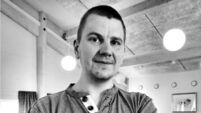West Cork pharmaceutical facility competing on a worldwide scale
O’Dowd, 41, is technical director of the Merck Sharpe Dohme (MSD) facility at Brinny near Innishannon and takes pride in the fact that in the last three decades the plant has grown from a simple drug-making factory to become a centre of excellence, on a par with any worldwide.
The company manufactures and/or packages many of its leading products for the world market in Ireland, with 61% of MSD’s top 20 products made here.













